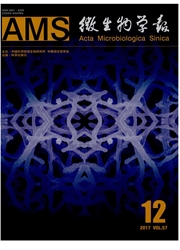

 中文摘要:
中文摘要:
为研究谷胱甘肽(GSH)在乳酸乳球菌NZ9000抗氧胁迫中的生理作用,以能够生物合成GSH的重组菌NZ9000(pNZ3203)为实验菌株进行了研究。结果表明,在较高H2O2胁迫剂量(150mmol/L H2O2,15min)下,前培养3h、5h和7h(即乳酸链球菌素诱导1h、3h和5h)时的重组菌细胞的存活率分别是处于相应生长时期对照菌NZ9000(pNZ8148)的1.8±0.1倍、2.6±0.1倍和2.9±0.3倍。表明GSH可以提高宿主菌NZ9000对H2O2所引发氧胁迫的抗性。GSH还可以提高宿主菌NZ9000对其它化学物质(如超氧阴离子自由基生成剂——甲萘醌)所引发氧胁迫的抗性。这表现在经20mmol/L甲萘醌处理60rain后,前培养5h(即乳酸链球菌素诱导3h)时重组菌细胞的存活率是对照菌的6.2±0.1倍。由此表明,通过代谢工程手段在菌株NZ9000中引入GSH合成能力,可以提高宿主菌对氧胁迫的抗性。
 英文摘要:
英文摘要:
To assess the physiological function of GSH in resistance to oxidative stress in Lactococcus lactis ssp. cremoris NZ9000, the recombinant strain NZ9000 (pNZ3203) capable of producing GSH was used as the experiment materials. The anti-oxidant role of glutathionewas observed under higher H2O2 dosage, i.e., 150 mmol/L H2O2 treatment for 15 min. The resistance of NZ9000 (pNZ3203) cells grown for 3 h, 5 h, and7h ( nisin-induced for ] h, 3 h and 5 h) were 1.8-fold, 2.6-fold, and 2.9-fold that of NZ9000 (pNZS]48) cells, respectively. In addition, the survival of NZ9000 (pNZ3203) cells grown for 5 h (nisin-induced for 3 h), upon treatment of 20 mmol/L menadione for 60min, was 6.2-fold that of NZ9000 (pN8148) cells. Therefore, introduction a new biosynthetic pathway of glutathione could confer higher resistance to oxidative stress on L. lactis NZ9000.
 同期刊论文项目
同期刊论文项目
 同项目期刊论文
同项目期刊论文
 期刊信息
期刊信息
